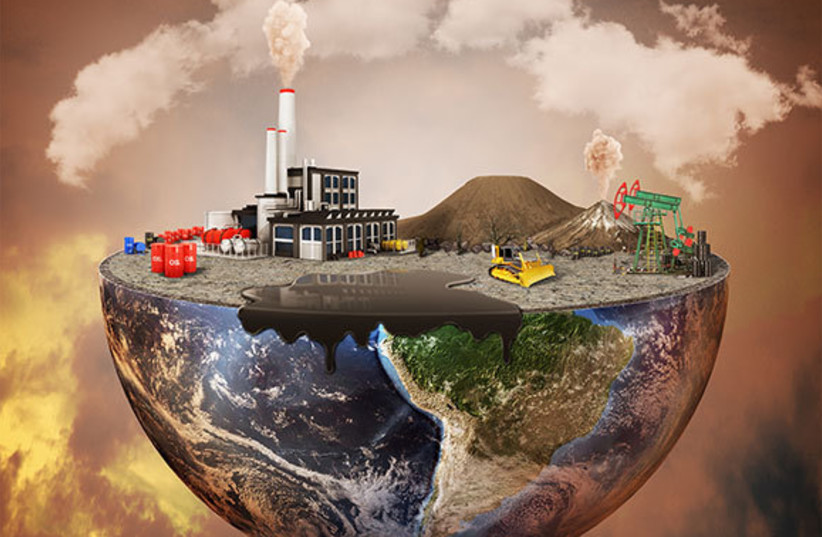Digitalization can't make us blind to environmental threats - opinion

The digital age is proving to provide limitless benefits for humanity. If we aren't careful however, the costs can easily outweigh them.
Technology and innovation have undoubtedly enhanced our lives by revolutionizing education, science, medicine, culture, and social interaction. Nevertheless, this progress carries significant environmental concerns that warrant our attention. Balancing digital innovation and environmental protection has become a pressing issue.
A case in point is Israel’s 5G debate. The High Court of Justice recently deliberated on the government’s plan to roll out 5G Internet technology nationwide. The petitioners raised alarms about potential radiation and environmental damage, arguing that the government’s preliminary assessments were insufficient. Although the Court dismissed the petition, Justice Uzi Fogelman emphasized the need for ongoing research into the environmental impacts of digital advancements.
Nevertheless, digital technologies offer significant environmental benefits. Virtual meetings reduce transportation-related pollution. Moreover, green-tech innovations provide revolutionary solutions to environmental challenges, from climate change to species extinction. Notably, Israeli start-up Eco Wave Power converts waves into energy, while Home Biogas converts compost into biogas for cooking and agriculture fertilization. Finally, digitalization conserves natural resources by reducing the need for paper, thus saving trees.
As to the hidden environmental costs, without attempting to fight a losing battle against digital innovation, room is slowly but surely being made to ask the difficult but crucial question: How do we ensure that digitalization and digital innovation at large serve humanity and the environment we live in?
Drawing global attention at the 2023 climate summit (COP28), digitalization’s environmental impact was a key topic. The UN Conference on Trade and Development reported that up to 12% of global energy was used for online traffic, and that, globally 53.6 million tons of e-waste [discarded electrical or electronic equipment] are generated annually.
The European Commission has pledged to address this issue by raising awareness and reducing its data footprint as part of its broader climate strategy. The tech industry is also beginning to hold itself accountable in this regard as Indian start-up Karo Sambhav aims to confront India’s e-waste through a coordinated multi-stakeholder approach, and German company Vodafone unites with Dutch start-up Closing the Loop to reintegrate used electronics and expand their recycling efforts.
Health is a human right
The human right to health has been recognized as encompassing a safe, clean, healthy, and sustainable environment. This right is integral to enjoying other human rights, such as to life, health, food, and water. Recent rulings – like that of the European Court of Human Rights which holds the Swiss Federation accountable for insufficient climate action – underscore the growing legal recognition of this right.
As we continue to benefit from digital advancements, it is crucial to account for their environmental consequences. Ongoing research into the environmental impact of digitalization, including energy consumption, radiation, pollution, and e-waste must be prioritized.
In balancing innovation and environmental protection, policymakers and tech leaders must ensure that environmental considerations are integrated into every step of technological development.
In conclusion, transparency is key to fostering public trust in new technologies.
Governments and tech companies should make their environmental impact assessments and mitigation strategies publicly available. Specifically, integration of new technological means should be evaluated with the environment in mind, whether it’s expanding the 5G infrastructure or broadening the use of devices that become part of the annual 54 million tons of e-waste – and those assessments should be shared openly.
By doing so, decision-makers and industry leaders can demonstrate their commitment to balancing progress with the right to a healthy environment.
As we navigate the digital age, let’s ensure that our innovations serve humanity and the planet we call home.
Dr. Tal Mimran works at the Cyber Security Research Center in the Law Faculty of the Hebrew University of Jerusalem. Adv. Eden Farber is a humanitarian law expert at Tachlith – The Institute for Israeli Policy.
Jerusalem Post Store
`; document.getElementById("linkPremium").innerHTML = cont; var divWithLink = document.getElementById("premium-link"); if (divWithLink !== null && divWithLink !== 'undefined') { divWithLink.style.border = "solid 1px #cb0f3e"; divWithLink.style.textAlign = "center"; divWithLink.style.marginBottom = "15px"; divWithLink.style.marginTop = "15px"; divWithLink.style.width = "100%"; divWithLink.style.backgroundColor = "#122952"; divWithLink.style.color = "#ffffff"; divWithLink.style.lineHeight = "1.5"; } } (function (v, i) { });

